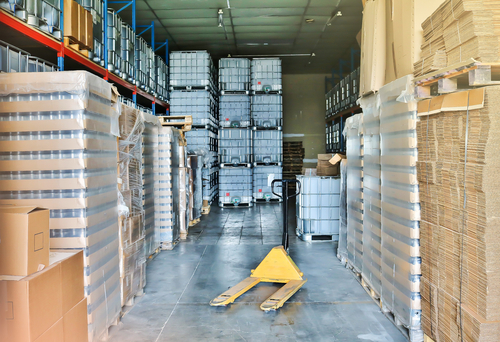
We get a lot of questions surrounding our IBC totes, as they’re some of the most versatile and durable warehouse containers available. But we understand that, because of this, there is also some confusion about what they can and can’t be used for. People often ask us whether or not food-grade IBC totes are temperature-controlled or not. The short answer is no, and the long answer is no, except for insulated bulk containers. Let’s cover the basics of these storage containers so that you get the most out of them in your warehouse, fulfillment center or manufacturing facility.
All About IBC Totes
Intermediate bulk containers (IBC) are reusable or one-time use containers that can be used for storing bulk materials, especially liquids and granular and flowable materials. This allows them to be employed in several unique applications and environments, from food processing plants (hence the need for food-grade IBC totes) to pharmaceutical plants and facilities that handle flammables and corrosives. Although they have many different purposes, these kinds of containers are actually united by a few important features.
These containers are generally made of a composite plastic material that sits inside of a galvanized iron cage which is attached to a pallet. As you probably already know, this allows you to easily transport and stack your IBC totes via forklift or pallet jack. Standard-sized warehouse intermediate bulk containers usually hold 275 gallons (1,040 liters)—they are right in the middle volume-wise between drums and tanks, which is why they are called “intermediate” containers—but 330-gallon IBC totes are also common. Their modular design allows them to be easily stacked and organized in any warehouse or plant.
Since they’re made of a composite plastic material (usually polyethylene), these kinds of totes are easy to clean and can be designed to meet standards for food-grade plastic. Thus, they’re often employed to store and ship different kinds of perishable foods and liquids, many of which are sensitive to temperature fluctuations and need to be stored at an appropriate temperature to prevent spoilage. Of course, the U.S. Food and Drug Administration (FDA) and other regulating bodies require food to be shipped and stored in very precise ways, with many rules regarding temperature and material.
Insulated Bulk Containers
By far the best way to regulate temperature in bulk containers is to use insulated, food-grade bulk containers. These durable, high-quality units keep your materials cold and fresh so that they meet strict food-grade regulations and don’t spoil. Insulated storage containers come in an amazing variety of styles and sizes and can replace traditional IBC totes in some scenarios. However, if you need to use standard totes, there are certainly some things you can do to help regulate temperature.
More Ways to Control Temperature of IBC Totes
As previously mentioned, non-insulated IBC totes are not naturally temperature-regulated. But there are certainly some things you can do to upgrade your bulk totes so that they keep goods at the proper temperature. Here are a few quick tips. Make sure to always reference the maximum temperature rating of your specific IBC totes—while many have a max temp of 160 degrees Fahrenheit, there is some variation—to ensure that your goods are stored in the proper container.
- Monitoring your facility’s temperature is by far the simplest and most affordable way to keep your stored goods at a certain temperature. Be sure your heating and cooling systems are efficient and accurate.
- Use a time temperature indicator to easily monitor the temperature of your goods, especially if you’re storing them someplace that tends to fluctuate temperature-wise.
- Invest in a tote heater. These high-tech devices envelop the container with an external warm water system to help prevent the items inside from dipping below a certain temp. They typically stay outside the container so they don’t contaminate food-grade items.
- Use drum pallet quilts, which surround the tote portion (not the pallet) in an insulated material, to help keep temperatures stable.
If you have any questions about finding the right totes for your specific application, don’t hesitate to reach out to us and we’d be glad to assist you. Container Exchanger offers a huge assortment of shipping and storage containers that you can use to get goods from point A to point B in their best possible shape in order to maximize and protect your investment.
